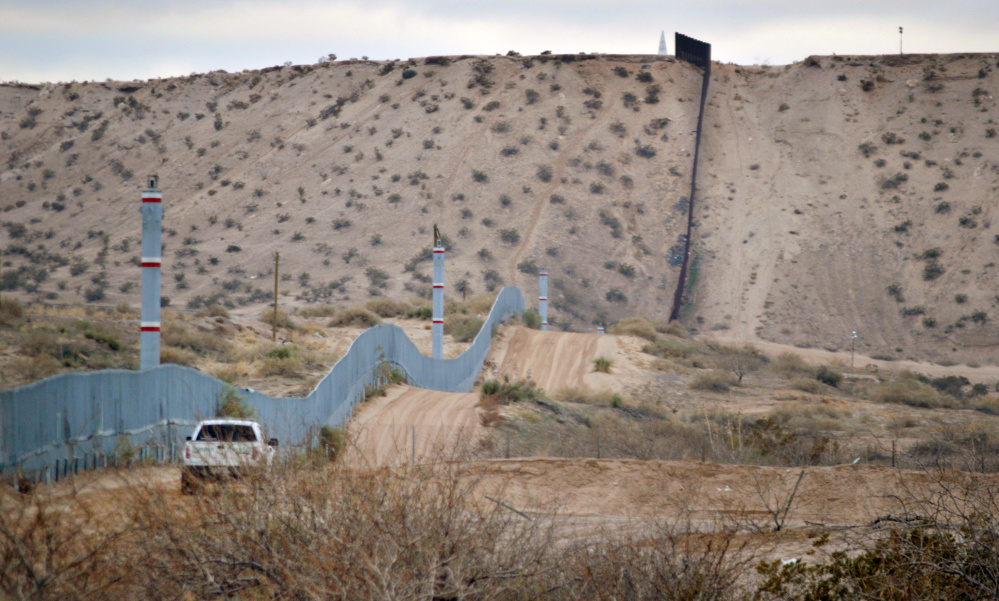WASHINGTON — Republicans on Capitol Hill say they don’t need to wait for Mexico to make good on President-elect Donald Trump’s central campaign promise: building a southern border wall.
In fact, they are happy to underwrite the wall themselves, at a potential cost of many billions of dollars.
The GOP’s willingness to fund Trump’s border wall with taxpayer money could put the party’s deeply held desire to rein in government spending in conflict with its long-standing goal of cracking down on illegal immigration and toughening border security. Nonetheless, many Republicans do not see an inherent conflict.
“It would be a proposal that would cost billions of dollars to get done, but if it’s an appropriate priority for our country, it’s worth spending that kind of money,” said Rep. Luke Messer, R-Ind., chairman of the House Republican Policy Committee.
There is no reliable price tag on building a border wall, but Trump has estimated the cost at $8 billion. Recent congressional legislation pegged the number at $10 billion, and construction experts say it could be more than double that.
The wall is one part of a massive spending strategy at the core of Trump’s populist agenda. Trump has not provided extensive details on how he plans to follow through on vows such as overhauling the tax code, repealing and replacing the Affordable Care Act, and executing a sprawling infrastructure program. But each of those proposals carries an exorbitant price tag, and experts say that combined, they could add trillions of dollars to the deficit.
Experts at the nonpartisan Tax Policy Center estimate that Trump’s tax proposals alone could add as much as $7.2 trillion to the deficit in the coming decade. Even-more-conservative estimates, such as those produced by the right-leaning Tax Foundation, concluded that Trump’s tax proposals would create at least a $4.4 trillion budget hole in the same time frame.
The costs of rolling back the ACA are harder to predict. Repealing the entire law would increase deficits by more than $350 billion over a decade, according to a 2015 report from the Congressional Budget Office, which serves as an independent scorekeeper.
If Congress plans to mimic a 2015 attempt at repeal, the eventual legislation could reduce deficits by $282 billion. But lawmakers have yet to reveal a plan to replace the ACA with tax breaks and benefits that could more than offset any savings.
Trump has not outlined a detailed plan for infrastructure spending. But his nominee to be commerce secretary, Wilbur Ross, has suggested that the government offer approximately $140 billion in tax credits to nudge companies to invest $1 trillion of their own money.
Under President Obama, Republicans decried new federal spending to stimulate the economy, expand health-care coverage and pursue other domestic priorities. But so far, they seem to harbor no similar qualms about Trump’s platform.
“I think realistically we’re going to have to find a way to fund this,” Sen. Steve Daines, R-Mont., an Appropriations Committee member, said about the border wall. He said the Trump transition team has not directly contacted the committee on the issue.
Other Republicans reacted with a shrug, pointing to support and even money for building a wall that has already been provided by Congress.
“We’ve already appropriated money for walls,” said Sen. Charles Grassley, R-Iowa. “We’ve got walls right now.”
Rep. Steve King, R-Iowa, a fierce opponent of illegal immigration, is not worried about when or how Mexico reimburses the U.S. government for the massive construction project.
“If we build that wall, and Donald Trump hasn’t figured out how to get Mexico to pay, I’m not going to be the guy who says, ‘Let’s wait until we get this in pesos,’ ” King said.
The Trump team is committed to moving forward on the wall quickly and before Republicans become uneasy about the project and its political cost, according to several people close to Trump.
A national exit poll of presidential voters found that only 41 percent supported building a wall along the entire border with Mexico.
But among Trump supporters, three-quarters backed the proposal.
And there is plenty of skepticism that Trump will ultimately follow through: A CNN/ORC poll taken after the election found just under half of all Americans thought it was at least somewhat likely that Trump would build a wall along the southern border, while a November Quinnipiac poll found just 19 percent of registered voters thought Trump would get Mexico to pay for such a wall.
Trump’s strategy is being driven by several advisers, in particular those with political links to Sen. Jeff Sessions, R-Ala., Trump’s nominee to be attorney general.
Copy the Story LinkSend questions/comments to the editors.



Success. Please wait for the page to reload. If the page does not reload within 5 seconds, please refresh the page.
Enter your email and password to access comments.
Hi, to comment on stories you must . This profile is in addition to your subscription and website login.
Already have a commenting profile? .
Invalid username/password.
Please check your email to confirm and complete your registration.
Only subscribers are eligible to post comments. Please subscribe or login first for digital access. Here’s why.
Use the form below to reset your password. When you've submitted your account email, we will send an email with a reset code.